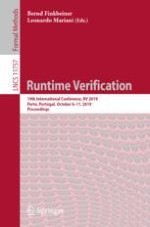2019 | OriginalPaper | Buchkapitel
Neural Predictive Monitoring
verfasst von : Luca Bortolussi, Francesca Cairoli, Nicola Paoletti, Scott A. Smolka, Scott D. Stoller
Erschienen in: Runtime Verification
Aktivieren Sie unsere intelligente Suche, um passende Fachinhalte oder Patente zu finden.
Wählen Sie Textabschnitte aus um mit Künstlicher Intelligenz passenden Patente zu finden. powered by
Markieren Sie Textabschnitte, um KI-gestützt weitere passende Inhalte zu finden. powered by
